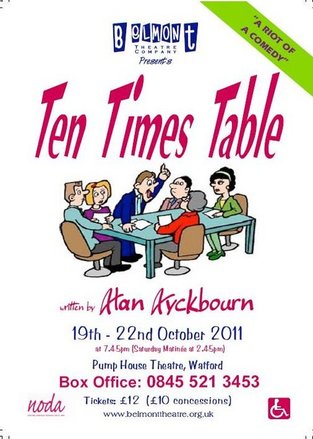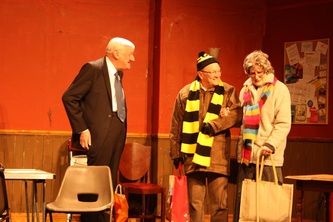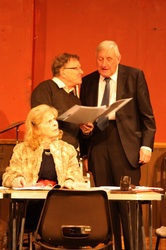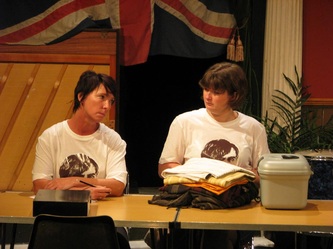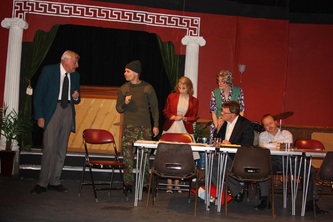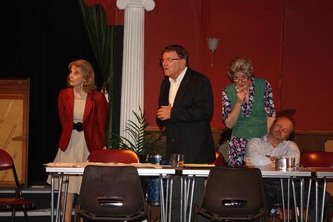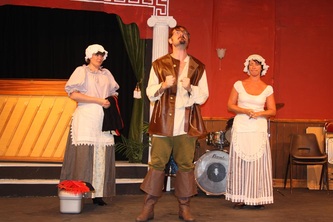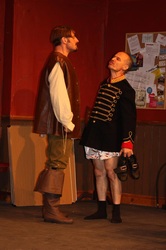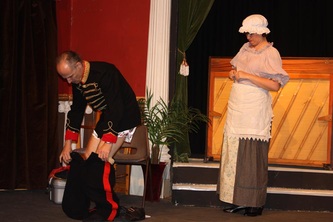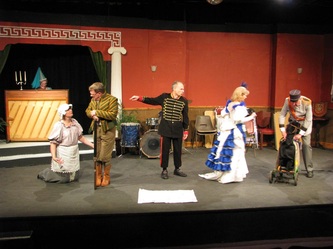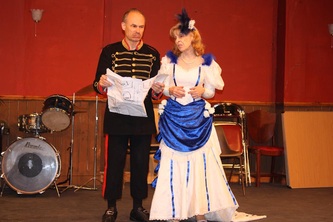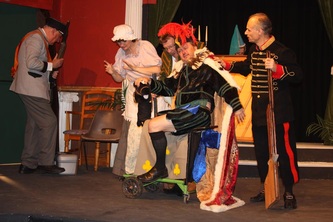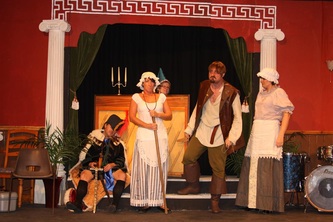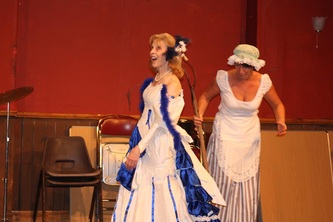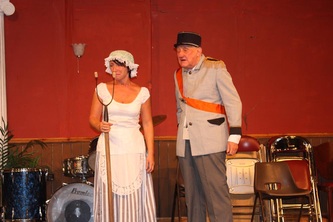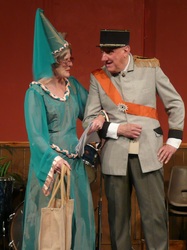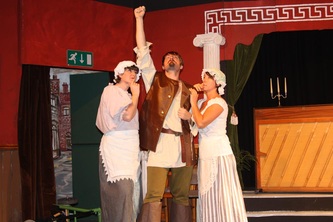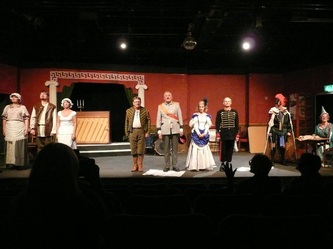Ten Times TableWritten by Alan Ayckbourn
Directed by Lorna Alder & Michael Collins Performed at the Pump House Theatre, Watford. Wednesday 19th to Saturday 22nd October 2011 In the ballroom of a dilapidated hotel, a group of local members of the Pendon community are organising a town pageant based on a lost piece of local history, the massacre of the Pendon Twelve – where the Earl of Dorset crushed an uprising of rebellious workers. The organising committee comprises characters with very different views of what the pageant should be and what it represents. As the meetings progress, the group becomes ideologically divided with the left-wing side, led by a Marxist Polytechnic teacher, building it up as a political rally. The right-wing side of the committee plan for a violent confrontation in response. The pageant ends in chaos, broadly recreating the original event, leaving no-one better off especially when it turns out there is no historical authenticity to the Pendon Twelve Massacre. This is a riot of a comedy in true Alan Ayckbourn style.
| |||||||
Cast
|
Crew
|
NODA Report
National Operatic & Dramatic Association - London Region
Society : Belmont Theatre
Production : Ten Times Table
Date : 21st October 2011
Venue : The Pump House Theatre, Watford
Report by : Harvey Kesselman
Set in a rather faded ballroom in The Swan Hotel, a rather disparate group of people meet as a committee to discuss organising a pageant based on an historic event that took place, locally, in the eighteenth century. Known as the ‘Massacre of the Pendon Twelve’, this occurred when the Earl of Dorset crushed a group of mutinous workers, led by John Cockle.
As Ray, the self-appointed chairman, Bernard Vick, although constantly being interrupted by the lights failing and a noise of hammering from somewhere else in the building, nevertheless tried to keep some semblance of order. Bernard’s dialogue was occasionally rather hesitant, but he did manage, at first, to control the meeting and his performance did show authority, however brief. He tried, without much success, to give an explanation of the massacre from a publication he had found, but really fails to make it very interesting. Ably supported by his wife, Helen, middle-class, bossy, rather overbearing, very right wing character, played by Carole Baynes, who gave a wonderful performance as the tough royalist who sees her idea of a folk festival being threatened. Her opponent was Eric, a Marxist, a teacher wanting to turn the whole pageant into a political rally. Rob Smith, looking more like a student than a teacher, played the role with a welsh accent. He seemed to believe himself to be the re-incarnation of John Cockle and is only kept under control by his ‘live-in’ girl friend, Phillippa, a nice under stated performance by Lisa Pitman. Unfortunately his accent often got in the way of the dialogue, which occasionally was difficult to understand. A lot of the humour in this very funny play came from two excellent performances, given by Bill Baynes as Donald and his ‘mother’ Audrey, Julia Patterson. Donald, a local councillor, trying to make certain the meeting was held according to the rules, interrupting all the time with useless questions etc. and generally being a pain in the ….. He had brought his elderly, octogenarian, and hard of hearing mother, to take the minutes of the meeting. Bill had this very funny North Country accent and, as a local councillor, had been unsuccessful in obtaining any grants from the council to help finance the festival. His 80 year old mother volunteered to do some research on the massacre, and also would provide some music during the pageant. Julia was most amusing throughout and one of the funniest scenes in the play was almost at the end of the second act, when, seated at a piano on a raised platform at the back of the stage, she is seen playing an inaudible medley, swaying to the music completely oblivious to the chaos happening around her. Judy Campion played Sophie, a breeder of sheepdogs, found herself attracted to Eric and supported him and his ideas, neglecting her work much to the annoyance of her brother. Another good performance with some well projected dialogue.
The committee soon found itself split into two factions, one wanting a folk festival, and the other a left wing political rally. On the one side, those who wanted a folk festival, we had Helen, Ray, Donald and his mother Audrey, then Lawrence, a rather sad character, whose wife was on the point of leaving him and who sought comfort in alcohol, occasionally falling asleep. This very mournful character was played by Paul Williams, whose slurred dialogue added to the hilarity of the play, especially his long rambling speech about the break-up of family life and its affect on the country. Added to these four was the mad militarist Tim. Tim was Sophie’s brother, played by Laurence Conway. A very amusing OTT performance. We first see him as a dog breeder, annoyed at the time Sophie spends at these committee meetings but then, when he is recruited by Helen to assist her (and her supporters) to prevent ‘the other side’ from holding their rally, he is then seen in a different light. Dressed in battle dress, Tim rushes around with a loaded revolver declaring war on the ‘lefties’. The rival group, wanting a political rally had Eric, with his factory contacts and a great debating skill together with Sophie, and Phillippa. There was supposed to be a tenth member of the committee but an apology from a local property owner together with his donation of £5 is greeted with derision by Eric.
The whole pageant/rally ends in a riot with Eric declaiming to the crowd, a drunken Lawrence, as the royalist falling off his hobby horse, Tim rushing around brandishing his revolver that unfortunately is fired wounding Eric, Audrey at the piano and Helen being carried off by Max Kirkov (Bill Rebello), a large bearded student co-opted earlier by Eric. Of course, no one wins in this ‘class struggle’ between the opposite ends of the political spectrum. But then we learn there was an even earlier bloodier battle that took place at Pendon between the Ancient Britain’s and the invading Romans!!!!
The set, designed by Michael Collins, constructed by Bill Rebello and company, really gave the impression of a very run-down ballroom, with a large faded union flag, a wall clock that didn’t work, an upright piano on a rostrum, and a general feeling the place had seen better times. Bill Rebello was also the Stage Manager assisted by Tom Adler; Sound, Amy Caulfield; Sound Effects, Jim Gatt; Costumes, Anne Sutherland; Props, Mary-Anne Anaradoh and Les Sutherland and Continuity, Mary Woolf.
This was a very funny play with excellent characterization and great timing by all the actors. It was good to see a full house with an audience who obviously enjoyed the evening judging by the peals of laughter that ‘rocked’ the Pump House’. Many congratulations to the Co-Directors, Lorna Adler, Michael Collins and the whole company.
Incidentally, who was the chap that came on stage a couple of times, whistling and carrying a ladder?
Society : Belmont Theatre
Production : Ten Times Table
Date : 21st October 2011
Venue : The Pump House Theatre, Watford
Report by : Harvey Kesselman
Set in a rather faded ballroom in The Swan Hotel, a rather disparate group of people meet as a committee to discuss organising a pageant based on an historic event that took place, locally, in the eighteenth century. Known as the ‘Massacre of the Pendon Twelve’, this occurred when the Earl of Dorset crushed a group of mutinous workers, led by John Cockle.
As Ray, the self-appointed chairman, Bernard Vick, although constantly being interrupted by the lights failing and a noise of hammering from somewhere else in the building, nevertheless tried to keep some semblance of order. Bernard’s dialogue was occasionally rather hesitant, but he did manage, at first, to control the meeting and his performance did show authority, however brief. He tried, without much success, to give an explanation of the massacre from a publication he had found, but really fails to make it very interesting. Ably supported by his wife, Helen, middle-class, bossy, rather overbearing, very right wing character, played by Carole Baynes, who gave a wonderful performance as the tough royalist who sees her idea of a folk festival being threatened. Her opponent was Eric, a Marxist, a teacher wanting to turn the whole pageant into a political rally. Rob Smith, looking more like a student than a teacher, played the role with a welsh accent. He seemed to believe himself to be the re-incarnation of John Cockle and is only kept under control by his ‘live-in’ girl friend, Phillippa, a nice under stated performance by Lisa Pitman. Unfortunately his accent often got in the way of the dialogue, which occasionally was difficult to understand. A lot of the humour in this very funny play came from two excellent performances, given by Bill Baynes as Donald and his ‘mother’ Audrey, Julia Patterson. Donald, a local councillor, trying to make certain the meeting was held according to the rules, interrupting all the time with useless questions etc. and generally being a pain in the ….. He had brought his elderly, octogenarian, and hard of hearing mother, to take the minutes of the meeting. Bill had this very funny North Country accent and, as a local councillor, had been unsuccessful in obtaining any grants from the council to help finance the festival. His 80 year old mother volunteered to do some research on the massacre, and also would provide some music during the pageant. Julia was most amusing throughout and one of the funniest scenes in the play was almost at the end of the second act, when, seated at a piano on a raised platform at the back of the stage, she is seen playing an inaudible medley, swaying to the music completely oblivious to the chaos happening around her. Judy Campion played Sophie, a breeder of sheepdogs, found herself attracted to Eric and supported him and his ideas, neglecting her work much to the annoyance of her brother. Another good performance with some well projected dialogue.
The committee soon found itself split into two factions, one wanting a folk festival, and the other a left wing political rally. On the one side, those who wanted a folk festival, we had Helen, Ray, Donald and his mother Audrey, then Lawrence, a rather sad character, whose wife was on the point of leaving him and who sought comfort in alcohol, occasionally falling asleep. This very mournful character was played by Paul Williams, whose slurred dialogue added to the hilarity of the play, especially his long rambling speech about the break-up of family life and its affect on the country. Added to these four was the mad militarist Tim. Tim was Sophie’s brother, played by Laurence Conway. A very amusing OTT performance. We first see him as a dog breeder, annoyed at the time Sophie spends at these committee meetings but then, when he is recruited by Helen to assist her (and her supporters) to prevent ‘the other side’ from holding their rally, he is then seen in a different light. Dressed in battle dress, Tim rushes around with a loaded revolver declaring war on the ‘lefties’. The rival group, wanting a political rally had Eric, with his factory contacts and a great debating skill together with Sophie, and Phillippa. There was supposed to be a tenth member of the committee but an apology from a local property owner together with his donation of £5 is greeted with derision by Eric.
The whole pageant/rally ends in a riot with Eric declaiming to the crowd, a drunken Lawrence, as the royalist falling off his hobby horse, Tim rushing around brandishing his revolver that unfortunately is fired wounding Eric, Audrey at the piano and Helen being carried off by Max Kirkov (Bill Rebello), a large bearded student co-opted earlier by Eric. Of course, no one wins in this ‘class struggle’ between the opposite ends of the political spectrum. But then we learn there was an even earlier bloodier battle that took place at Pendon between the Ancient Britain’s and the invading Romans!!!!
The set, designed by Michael Collins, constructed by Bill Rebello and company, really gave the impression of a very run-down ballroom, with a large faded union flag, a wall clock that didn’t work, an upright piano on a rostrum, and a general feeling the place had seen better times. Bill Rebello was also the Stage Manager assisted by Tom Adler; Sound, Amy Caulfield; Sound Effects, Jim Gatt; Costumes, Anne Sutherland; Props, Mary-Anne Anaradoh and Les Sutherland and Continuity, Mary Woolf.
This was a very funny play with excellent characterization and great timing by all the actors. It was good to see a full house with an audience who obviously enjoyed the evening judging by the peals of laughter that ‘rocked’ the Pump House’. Many congratulations to the Co-Directors, Lorna Adler, Michael Collins and the whole company.
Incidentally, who was the chap that came on stage a couple of times, whistling and carrying a ladder?
